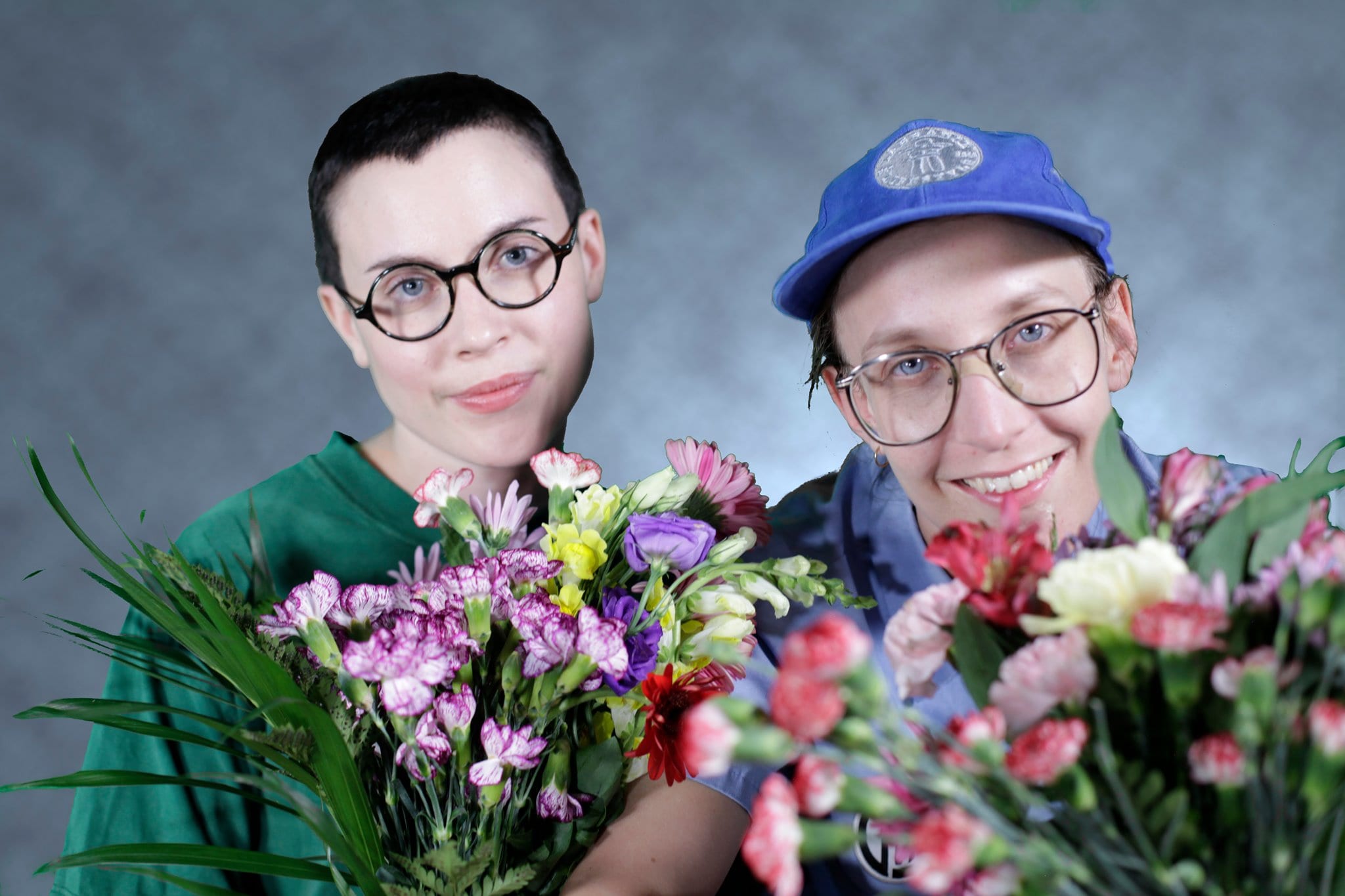Lucy Niles and Josée Caron are united by the power of post-classic rock. The founding frontwomen of loud and proud guitar-shredding band Partner define their musical genre as a sound with “riffs like classic rock, but people like us are allowed to make it.”
As in any good teen drama, they first met in a school cafeteria. Before arriving at Mount Allison University, the liberal arts college in Sackville, New Brunswick, Niles grew up in Newfoundland and Labrador’s Happy Valley-Goose Bay, while Caron’s hometown is Summerside, Prince Edward Island. They’d had bands before Partner, like Yellowteeth and The Mouthbreathers, but this full-throttle vehicle allowed them to write hilariously unashamed lyrics about their experiences as openly gay, weed-smoking best friends.
Following a string of early songs like “The ‘Ellen’ Page” and “We’re Gay (But Not For Each Other),” Partner’s 2017 debut album, In Search of Last Time, earned them critical and popular acclaim. They spent the next three years touring the world, stripping down their original formation as a five-piece band to become a trio with powerhouse drummer Simone TB. Throughout this time, Niles and Caron began writing the songs that form their upcoming sophomore LP, Never Give Up. On their latest single, “Big Gay Hands,” they channel electrified country-rock into an ode to the kinds of touch they miss when they’re constantly on the road.
After the request was sent to interview Partner over video chat from their new home in Montreal, Niles responded that there could be “no question too gay.”
Challenge accepted.
You’ve said that the two of you formed this band “to discuss being gay.” Can you tell me a bit about your experiences before then, playing in bands and being part of the Sackville music community where those kinds of discussions might not be common?
Niles: Before we started Partner, we were still gay. There wasn’t much of a queer scene at that time, besides us and our friend, Nick—just a lot of dudes singing songs and stuff. At first I didn’t use any pronouns in my lyrics, which still seemed pretty gay. At a certain point, we decided to start talking about it, because it seemed like a huge thing to avoid and be neutral about it. Back then people would always say shit like, “It’s okay if you’re gay, but you can’t shove it down my throat.” First, we were like, “Yes we can.” Second, we realized that’s not what we’re doing when we just talk about our lives.
After Partner started, did it feel freeing to come out publicly in your music?
Caron: When I got to university, I told everyone I was gay. If I could have had a shirt that said “Hi, I’m gay,” I would have worn it everywhere. For me, it felt perfectly natural to do that in our music because it’s a huge part of who I am. We were just gayly expressing ourselves.
Niles: At the time it didn’t feel like we were telling everyone in the world that we were gay. Could anyone not immediately tell just by looking at us? [laughs]
It seems like you got to meet some of your queer heroes pretty early on. What was it like working with Ellen Page? Did you end up hanging out with Melissa Etheridge?
Caron: We didn’t actually meet Ellen Page. Here’s the story of that video: It’s found footage from that TV show she was on, The Tracey Fragments. A friend of ours was really obsessed with Ellen Page and knew that the director had released all of the footage and B-roll for Creative Commons, so we made it out of that. We did meet Melissa Etheridge, though.
What was that like?
Caron: It was a dream come true. We were in line with some other people at her meet-and-greet and she said, “I know who you are.”
Niles: She had her arms around us the whole time, and we were freaking out. We gave her a Partner pin.
Who else would you like to meet or work with some day?
Niles: Meeting someone who’s a hero always makes me want to puke at first, but then it’s the best thing ever. It seems like when it happens there’s a sign from the universe that something is going on.
Caron: I want to meet the team behind Portrait of a Lady on Fire. [Swooning voice] I really want to hang out with them. Now I’m blushing. Next question.
Your drummer, Simone TB, is definitely one of my heroes. What has it been like touring and recording your latest album with her?
Caron: It’s the best. She’s the heartbeat.
Niles: Literally the heartbeat. She’s the only person we know who’s as obsessed with rock as we are and who is also queer.
Caron: Her main thing is rocking. Rock is the priority. She triangulates us perfectly.
Why did you decide to strip the band down to a power trio?
Niles: We did a strip because everybody had other shit to do in their lives and wanted to do other shit. Our thing that we have to do is continue to spread gay music, and Simone TB kicks so much ass. It’s just so incredible to have queer femergy or whatever. That’s the direction we’re going on. Shout out to chicks!
You’d been touring pretty non-stop up until 2020, and I’ve read that your new album came together in that time. Can you tell me about the process of writing on the road?
Niles: I guess we didn’t have to be in a writing mindset for a long time. When we wrote all of those old Partner songs, it took years until our first album came out. Then when it came time to have to write new stuff, it was almost like a new experience again.
Caron: After everyone else in the band moved on, we reunited in a way and rediscovered writing together. One night we wrote the beginnings of five songs; I made little demos of each one and we had those to refer back to. We built it pretty slowly over many months.
Niles: We had a lot to say because it had been a good four years since our first album came out. The first record was a bunch of songs written over a longer period of time, but these ones all came out like bam, bam, bam. Never Give Up was all written in the last two years, so it’s very unified and cohesive.
Listening to your new album, I hear a bit of a country-rock or Thin Lizzy influence, but then there are also piano-heavy songs that have a Vanessa Carlton vibe. How would you describe the way your sound has changed?
Caron: I would say it’s more confident and open. I had a lot of time to work on it at home, and this was my first time experimenting with that. It wasn’t all done in the studio, which is so, so different. I would send everything to Chris Shaw, our mix engineer, and he would make sense of it all. Now we’ve evolved even past that process.
Niles: When we made the first record, if someone we liked or respected said, “Maybe you shouldn’t do this,” we would be like, “Okay, fair.” On this record, we wouldn’t even ask. And if somebody tried to tell us, we would say, “Shhhhh.” We trust ourselves and don’t need to ask anyone for their opinions.
How do you define post-classic rock?
Niles: It has riffs like classic rock, but people like us are allowed to make it. Classic rock is sick, but there are so many things about it that are unforgivable. There are a lot of pervy songs and obviously things that don’t vibe with our values. Post-classic rock can be queer, and it’s a term we kind of invented to describe our music.
Progressive rock was taken, so I guess you needed something else.
Niles: Yeah, and we’re not post-rock either. Post-rock doesn’t have Thin Lizzy influences. How about just rock if it was gay? You don’t have to be gay to play post-classic rock, but you have to understand where it fits.
Can you tell me about your new single, “Big Gay Hands”?
Caron: It’s our lustiest song. I was in a long-distance relationship with my current girlfriend, and we would go months without seeing each other, so it’s about missing that touch. Sometimes you can notice that people have hands that look gay with the right gaze.
Niles: “Big Gay Hands” is an attitude and something we find hot. We like it so we wrote an ode. That’s the power of BGH.
How do you feel about being openly gay now versus when you started playing music? Has culture changed for the better?
Niles: The year we started playing music was the year Pitchfork gave Liz Phair 0/10 for making an album that sounded good, basically. Even the dude who wrote it recently said, “Wow, that review sucks.” Things have changed so much since 2003. It was a wild time then to be young and impressionable, when people were basically just like, “girls suck.” That was the vibe of the time. It’s been extremely validating to go from being a kid then and saying, “Okay, I’m going to play guitar anyway,” to now feeling like I was right all along. Shout out to Pitchfork for giving our last EP a great review and a hot 6.9/10. We were legitimately and unironically stoked.


 Why you can trust Xtra
Why you can trust Xtra


